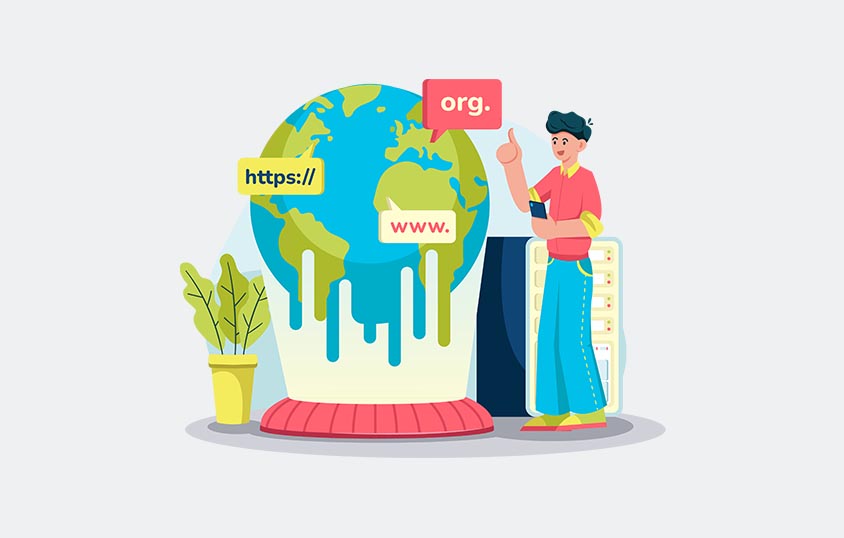Content
Recent Posts
Free Domain Registrars: Benefits, Risks & Top Picks

Free options can be hard to resist. Whether it’s a streaming trial, a free app, or a free domain name, that word often makes you feel like you’re getting something valuable without paying. But in the world of domain name registration, free doesn’t always mean ownership or stability. Your custom domain name is more than just a URL. It shapes your brand identity, affects how potential customers find your website, and can even impact email deliverability. If someone offers you a free domain, it’s essential to understand what you’re actually signing up for.
This blog explains how free domain name registration works, why it can be useful, its limitations, and when you should think twice before relying on it. You’ll also learn about some of the most well-known free domain providers and how to decide if one fits your business plan.
Content
How Does Free Domain Registration Work?
Free domain registration doesn’t follow a single model. It can come from bundled offers, limited domain extensions, or subdomains attached to free website builders. Some providers also experiment with decentralized systems that work outside the traditional DNS.
Bundled with hosting or website builder plans
Many hosting companies offer a free domain for the first year when you buy a hosting plan. For example, Hostinger includes a free domain with specific hosting tiers. This usually gives you access to popular extensions such as .com or .net, and the domain renews at its regular price afterward.
Free domain providers
Freenom became well known for handing out new domain names like .tk, .ml, and .ga for free. These were widely used by small projects, but Freenom has since announced it will leave the registrar business, causing millions of domains to go offline. This became one of the clearest reminders of why understanding ownership and stability matters when dealing with free domain registrars.
Another option is Biz.nf, which offers free .co.nf domains along with basic hosting. This type of service is often used for personal projects or student work. While it provides a no-cost way to launch a site, it comes with similar branding limitations and fewer customization options compared to paid domains.
You can also find niche providers like EU.org, which has been offering free domain delegations for years. These options are more technical to set up and may lack mainstream support, but they show that Freenom isn’t the only free domain source available, just the most prominent one.

Free subdomains
This is the most common type of “free domain” you’ll encounter on website builders. Instead of getting your own domain name, you get a subdomain like yoursite.provider.com. You can’t transfer it, and your control is limited.
Alternative and emerging models
Some providers offer free “Web3” domains that don’t use the regular DNS. These are experimental, with limited browser and email address support. They may work for niche projects but not for mainstream use.
Pros of Free Domain Registration
Free domain registrars can be helpful in certain cases. They can lower entry barriers if your goal is to experiment, launch a small project, or run a temporary campaign.
Here are a few advantages:
- Lower initial costs — You can launch a website without spending on the domain itself
- Fast setup — Registration is usually tied to another service, letting you get online quickly
- Bundled extras — Some providers include SSL certificates, email forwarding, or DNS management during the free period
- Flexibility for short-term use — Ideal for testing ideas, building student projects, or setting up temporary landing pages
This kind of offer can be especially useful when you don’t need advanced domain features or long-term stability.
Risks & Cons of Free Domain Registration
The appeal of free domains fades quickly when you look at the trade-offs. Many business owners find out too late that the “free” label comes with hidden conditions or risks.
- Limited ownership — You may not fully control the domain. Some providers can reclaim it or restrict transfers if you try to move away
- Hidden renewal costs — Domains often renew at higher rates after the first year, erasing the savings you expected
- Limited TLD options — Free offers typically don’t include strong, trusted extensions like .com or .org
- Branding issues — Uncommon or subdomain addresses can make your site look less professional
- SEO and email problems — Free domains (especially widely abused ones) can trigger search engine distrust and affect deliverability
- Forced ads or branding — Some providers display their own ads or logos on your site
- Unreliable service — The provider can change terms or shut down without warning
A well-documented example is Freenom’s recent shutdown. After years of offering free domains, they pulled out of the registrar business, and millions of domains disappeared overnight.
Top Free Domain Registrar Options
Not all free domain providers operate the same way. Some are tied to hosting bundles, while others offer niche-free domains or alternative systems. Understanding how each one works helps you choose an option that fits your goals.
Biz.nf
Biz.nf offers free .co.nf domains along with basic hosting. It’s a straightforward option often used by students, hobbyists, and individuals launching personal projects. The setup is simple and quick, but the lesser-known extension can affect credibility for professional use.
EU.org
EU.org provides free domain delegations for users comfortable with a more technical setup. The service has been around for years and is supported by a loyal community. While it requires more effort than typical free offers, it provides more flexibility and reliability than most subdomain-based options.
Hostinger
Hostinger includes a free domain with its hosting plans for the first year. Since the domain is a standard TLD like .com, you get full ownership and the ability to transfer it to another registrar later. This makes it one of the most stable and trusted ways to secure a free domain.

When Free Domains Make Sense
There are valid reasons to use free domain registrars. For example:
- Experimenting with a concept without making a financial commitment
- Launching a short-term campaign or landing page
- Setting up a personal site, school project, or temporary event page
Free domains remove friction at the beginning. If the project doesn’t work out, you lose nothing. For early testing, this can be a practical choice.
When You Should Avoid Free Domains
Free domains are not a good fit for serious, long-term, or professional projects.
If your brand relies on trust, a free domain can work against you. They’re more likely to face credibility issues, be flagged by Google, or be restricted by providers. Businesses, personal brands, and professional services are better served with a paid domain.
Owning your domain gives you clear rights, transferability, and control over DNS and security settings. That peace of mind is hard to put a price on.
Real-World Examples
The risks and benefits of free domain registrars aren’t just theory. A few well-known cases show exactly how things can play out in practice.
Freenom’s abrupt shutdown
For years, Freenom dominated the free domain space by offering extensions like .tk and .ml. Millions of small projects, personal blogs, and test sites relied on these domains. But in early 2024, Freenom announced it would exit the registrar business after legal disputes and growing pressure over abuse concerns. As a result, more than 12 million domains were taken offline almost overnight. Many users had no backup or migration plan. This became one of the clearest examples of why relying on a free registrar can be risky.
Free subdomains and email deliverability issues
Many users who launched business sites on free subdomains found their emails landing in spam folders. This is because subdomains often lack proper authentication and are associated with higher abuse rates. For small businesses trying to look professional, this creates an immediate credibility problem.
Hosting bundles that work better
In contrast, users who got a free domain through hosting bundles from providers like Hostinger or IONOS experienced fewer problems. Since these offers involve real, transferable TLDs and more stable infrastructure, they provide a safer way to start with a free domain.

Final Thoughts
Free domain registrars can be helpful in the proper context. They allow you to experiment and build without upfront costs. But they come with strings attached: limited control, possible branding issues, unstable service, and potential hidden fees. The case of Freenom is a cautionary example. Millions of users lost their domains when the company stepped away from the business. If your website matters, paying for a domain ensures ownership, security, and long-term stability. For a broader look at what’s available, explore our full reviews in the domain registrars category, use our comparison tool to view top choices side by side, and browse our educational articles for deeper insights into features and pricing.
Frequently Asked Questions
Do free domains affect SEO?
They can. Free extensions with a history of abuse may reduce your site’s credibility and hurt your search rankings.
Are free domains secure?
They often have fewer security features and limited DNS control compared to paid domains.
How long can I keep a free domain before it expires?
The length of time depends on the provider and their policies. Many free domains are valid for one year, after which you may need to pay to renew or risk losing the domain.
What are the typical requirements to qualify for a free domain?
Most providers require signing up for a specific hosting plan, committing to a minimum contract, or purchasing extra services. Always review the terms carefully before claiming your free domain.